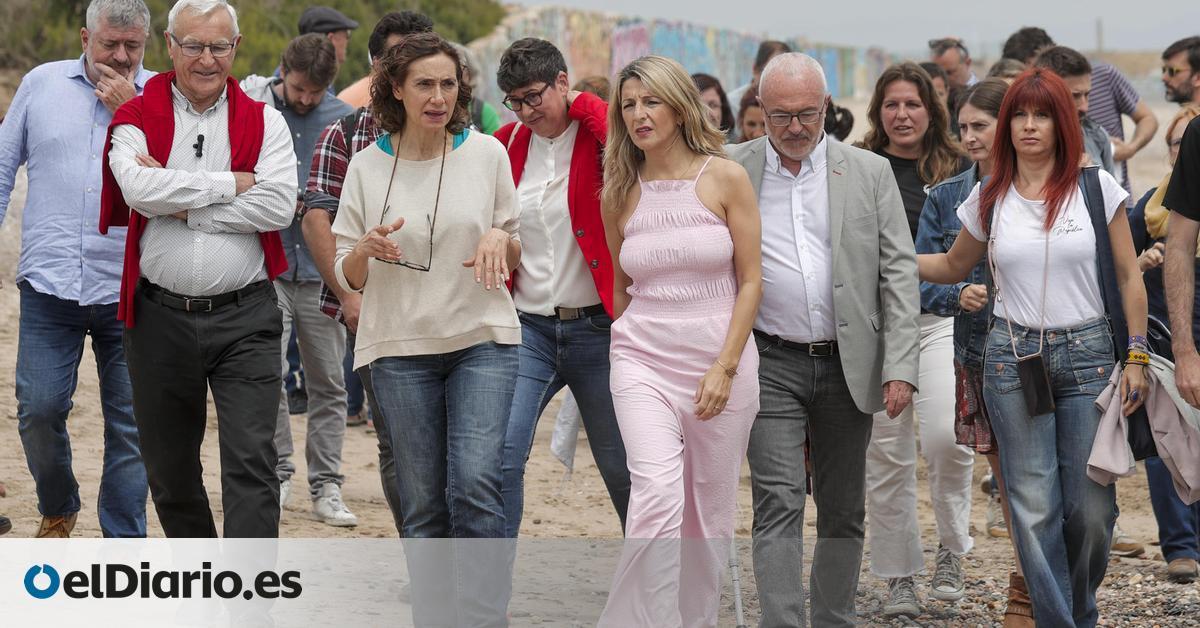
The electoral deadlines give the left very little room to reach an agreement and therefore narrow the possibility of drawing up the lists through open primaries, as demanded by Podemos to reach a coalition agreement with Sumar for the next general elections. . Without primaries, the solution for the design of the starting positions in the different constituencies of a candidacy that intends to group fifteen parties goes through a negotiation between leaders that began this Monday and that will foreseeably last for the next ten days, perhaps up to the limit established by law to register coalitions.
Yolanda Díaz registers “Movimiento Sumar” as a party to “facilitate the confluence” of the left
Further
Yolanda Díaz began a round of talks on Monday to start this process. In the afternoon, she called the general secretary of Podemos, Ione Belarra, for a first approach that neither party wants to give details of. Everything that has been taking place in the progressive space in the last few hours has passed in silence, which invites us to think that there is a will to reach an agreement that cannot take long. After the electoral debacle of the left on Sunday, all admit that the contacts are underway and express their willingness to reach that unity candidacy.
For now, Yolanda Díaz’s electoral platform already has a legal form: a political party under the name Movimiento Sumar that will serve, say sources from her team, as an instrument to facilitate unity between the different parties and also to be able to incorporate people independents who have participated in recent months in the listening process, the formula that the second vice president used as a launching pad for her career as leader of the space to the left of the PSOE.
From the registration of the political party, Sumar has the possibility of including people who are not part of other political parties in the list of the future coalition in which the rest of the parties involved in the process come together (Podemos, Izquierda Unida, los comuns , Más Madrid, Compromís and other regionalist-inspired formations). It is about incorporating the “citizen leg” of a political project that Yolanda Díaz has always defended that it should be more of a citizen movement than a political party.
“We promote a citizen movement, from society, in which the leading role is yours, not ours. You are going to add. It is not about parties, it is not about acronyms, it is about collective intelligence, about thinking about a better country. He is going to present a country project for the next decade,” Díaz said at the presentation ceremony for Sumar, in the summer of 2022, at the Matadero in Madrid.
The shape that coalition takes and how many members it includes is what is at stake these days. And it will surely have to be done at a negotiating table and not in a citizen consultation in which it is society (or the militancy of the parties called for a unitary call) that decides the weight that each party has in future lists. The debate during the months of talks at the beginning of the year between Sumar’s negotiating teams and the rest of the parties was about precisely that: how much should each formation represent (in the lists, but also in the economic distribution or in the name) of the future coalition.
With an amalgamation of 15 parties, the configuration of the lists lies in a very complex difficulty, as was seen in Andalusia, when an attempt was made to negotiate a coalition for the autonomic ones and in that case the range was made up of only six parties. United We Can obtained 35 seats in the last elections and the best forecasts give Sumar (with Podemos inside) around 50. But all these forecasts were made before the debacle last Sunday.
At the moment, there are already several parties that have shown their commitment to negotiate this process, beyond Izquierda Unida and the comuns, which for Yolanda Díaz are two of the main supports in the construction of Sumar. This Tuesday, formations such as Verdes Equo, Más Madrid or Alianza Verde have shown their willingness to negotiate their integration into the coalition. But for now, the most interesting step and one that shows the difficulty that this process entails has been taken by Compromís, which has appointed a commission to negotiate with Sumar and has set some basic conditions.
Their premise is not to dilute their identity: their name must be on the ballot, the electoral program must be the Valencian agenda (financing, infrastructure), they want a clear protocol on how they will operate in Congress and the Compromís candidates will head the lists in Valencia , Alicante and Castellón. In addition, they are not willing to share a ballot with the leaders of Podem. Once the agreement is signed, the branches of Compromís will have to submit it to a vote in their respective bodies and then it will have to go through the executive commission of the coalition. There is an extra addition: the party headed by Joan Baldoví wants to negotiate directly with Add the Valencian conditions, not be a heading in an agreement with Podemos. inform Laura Martinez.
The idea that was being handled in Sumar until the electoral process of the autonomous and municipal governments interrupted the talks was a negotiation in summer not so much of the lists but of the mechanism for preparing those lists, which could then be endorsed in a primary process at from the beginning of the course that would fulfill several objectives at the same time: democratically design the lists, provide an image of unity and mobilize the leftist electorate in a participatory process.
The system for deploying primaries in which all those registered and members of all parties participate (or all citizens, in the event that an open formula is chosen) implies certain logistics that takes time and also entails a negotiation that months ago it already brought problems: the creation of a new census, a platform for people to vote, a results verification process that satisfies all parties. The primary processes, in addition, are usually accompanied by a kind of campaigns, with rallies and debates of the options in contention.
The founder of Podemos, Pablo Iglesias, spoke about this on Monday on Cadena SER. “I wish there were [primarias]You have heard me defend here that democratic participation is key, but I have some political experience. In ten days, what are the other parties going to tell us? In Podemos there is a will, we get down and do them quickly. But they are going to tell us that in ten days this cannot be done. And in the end, what should have been a process of citizen overflow, of participation, of listening, in the end it is the turn of the plumbers to negotiate the lists of each province, everything that was not supposed to be done on this occasion. “, said.
In the party led by Ione Belarra, they defend that this is a situation that could have been avoided if time had not taken so long and an agreement had been reached, for example, before the launch of Yolanda Díaz’s candidacy for the presidency, in the Magariños sports center, on April 2. In Podemos they maintain that they had already warned that Pedro Sánchez could bring forward the general elections at any time and catch the entire space off guard, as has finally happened. The will now, in any case, is to achieve a unitary candidacy and, according to some voices in the party, this will take precedence over other matters of a more internal nature.
Source: www.eldiario.es

